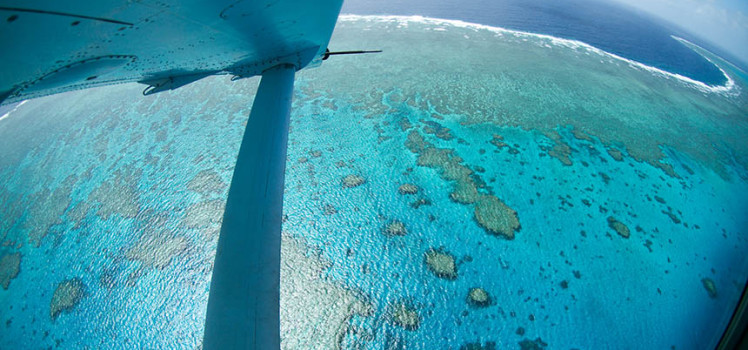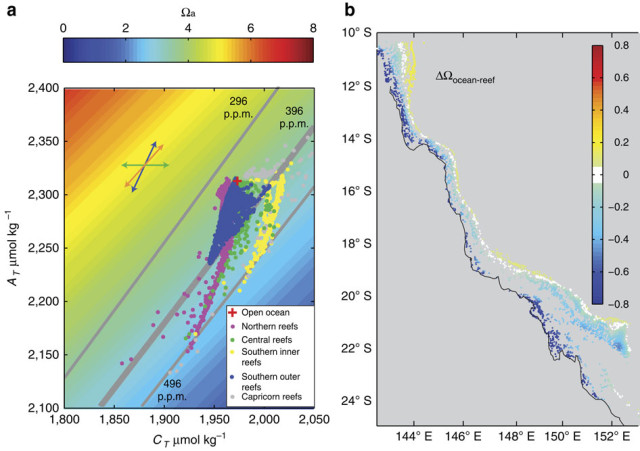The Great Barrier Reef & Acidification

Mathieu Mongin from CSIRO Oceans and Atmosphere and his collaborators published a paper in Nature Communications yesterday, February 23, stating
The Great Barrier Reef (GBR) ecosystem, described as one of the seven natural wonders of the world, is under increasing pressure from local and global anthropogenic stressors1. Coral calcification has continued to decline over the last few decades at rates similar to less well-managed reefs2, due to damage from cyclones, disease, invasive species (crown-of-thorns starfish), coral bleaching and possibly ocean acidification. In the long term, ocean acidification is expected to become an increasing threat to the GBR ecosystem3.
In other words, The Great Barrier Reef is in worse shape than suspected thanks to ocean acidification.
Aragonite saturation state for the 3581 coral reefs.

As highlighted by Helen Thomson in Science News,
Driven by rising atmospheric carbon dioxide, acidification lowers seawater levels of the mineral aragonite, which corals use to build their exoskeletons. The Great Barrier Reef actually contains 3,581 individual reefs, and a clear picture of aragonite levels across the reefs doesn’t exist. Mongin’s team used a combination of carbon, salinity and temperature data at 22 coastal sites from 2010 to 2012 and models of ocean circulation and chemistry from 2010 to 2014 to determine the current state of aragonite levels across the reefs and to predict which reefs might be most at risk.
Anthropogenic climate change is simply the greatest single public policy issue facing governments [for generations to come] and yet we continue to witness what can only be described as stunned inaction of the “non-reading managerial class”.
The Hon. Barry Jones succinctly identified the modern challenge in a speech at Victoria University last year:
“Today’s Australians are by far the best educated cohort in our history, but this is not reflected in the quality of our political discourse.
We appear to be lacking courage, judgement and capacity to analyse.
Australia, like the US, UK, Canada and much of Europe, has undergone a serious decline in the quality of debate on public policy. In an era of ‘spin’, when a complex issue is involved, leaders do not explain.
I’ve been arguing for a long time that evidence-based policies rather than sloganeering should be the basis for arguments. But the reality is that they are not. The quality of the argument has become really terrible.”
He was perhaps a little less circumspect [and certainly representative of my view] in 2012 when he opined that stupidity was on the rise in our age of enlightenment..
Links
Author: Mathieu Mongin, Mark E. Baird, Bronte Tilbrook, Richard J. Matear, Andrew Lenton, Mike Herzfeld, Karen Wild-Allen, Jenny Skerratt, Nugzar Margvelashvili, Barbara J. Robson, Carlos M. Duarte, Malin S. M. Gustafsson, Peter J. Ralph & Andrew D. L. Steven
Publication:Nature Communications
Publisher:Nature Publishing Group
Date:Feb 23, 2016
- Science News – Great Barrier Reef Acidification predictions get worse – Helen Thomson
- Public Lecture – Barry Jones – Evidence, opinion, interest: the attack on scientific method
- Flying Blind – Cuts to CSIRO Climate Research
- Article – Stupidity is now the rise in the age of enlightenment – SMH


